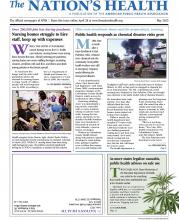
Get more tips on talking about health misinformation at www.surgeongeneral.gov
Photo by NicolasMcComber, courtesy iStockphoto
Do you believe in three-headed sea monsters? Hopefully not, because there’s no scientific evidence that they exist. But sea monsters and health misinformation have something in common. Both rely on fear and false information to spread their myths, and both feed on a lack of understanding to influence our beliefs and actions. In other words, like the mythical sea monsters of yore, health misinformation can harm your health and the health of your friends and loved ones.
According to the U.S. Department of Health and Human Services, health misinformation is “information that is false, inaccurate or misleading according to the best available evidence at the time.” Note the phrase at the end of that definition — “at the time” — because it’s important to remember that health information and recommendations often change as new science is available.
Health misinformation is different from health disinformation, even though the two words vary by just one letter. Health “disinformation” is when someone knowingly spreads fake health information with the intention of misleading others. Health misinformation happens quite often because we live in a fast-paced world and are exposed to health information everywhere we go — in conversations with others, social media, text threads, radio, emails, search engines, TV news and more.
You may sometimes forget part of what you saw or heard, or only hear what you want to hear because of your own fears and anxieties. You might go on and share that information without realizing it’s not true. That’s called “misinformation” and it can cause skepticism, distrust, anxiety and fear.
“Far too often, we are using things we read in social media, blogs or tweets or the comments from politicians that too often have no grounding in scientific fact,” says Reed Tuckson, MD, co-convener of the Coalition for Trust in Health & Science. “As a result, people either elect to do harmful things or choose not to do beneficial things, with the resulting impact leading to unnecessary deaths and preventable harm.”
It’s likely you’ve been in a situation where health misinformation is being shared and spread. Maybe your father told you he won’t fill his blood pressure medication because his friend said it made his hair fall out. Or perhaps your neighbor is urging you to use an unproven therapy for your diabetes because she heard about it on a late-night infomercial.
“All of us have had the unfortunate experience of encountering family members and friends who have been led astray by others’ misinformation and, oftentimes, political posturing,” Tuckson says. “When I encounter those situations, I have to always remind myself that even when we disagree, there has to be a common bond of our humanity and a common concern for them.
“We always have to start with love and compassion, and then from there offer them the best sources of information that we have available to us, and then continue to encourage them to make use of those.”
Don’t know what to do? Here’s where to start
The good news is that you can help debunk health misinformation with the people in your life.
Be empathetic. The ability to share and understand the feelings of someone else is the hallmark of a well-informed and enlightened person who cares about the health of others.
“When you confront someone who is spreading misinformation, the most important thing you can do is try to understand what they’re feeling,” Tuckson says. “Let them know that you care about them and that their health outcomes matter to you.”
Listen to fears. People are more inclined to trust you if you allow them to state their position. Don’t give in to the temptation to interrupt them or correct them, especially if there are others present. Focus on the broader issue and let them explain how they feel about that issue. Try to drill down into their fears.
Share with care. Health information is everywhere in the digital world, but not all of it is reliable. Make sure the sources of the information you share are from trustworthy and respected science-based organizations. Trusted sources include federal government agencies, universities, medical schools and large professional or nonprofit organizations.
Know when to step away. You’ve shown compassion and empathy and you’ve steered your listener to credible sources of information. But you’re not getting anywhere. At that point, it’s OK to end the conversation, Tuckson says.
“After you’ve tried your best and you’ve done all that you can, go back and make sure that you take care of yourself —take care of you,” he says.
- Copyright The Nation’s Health, American Public Health Association









